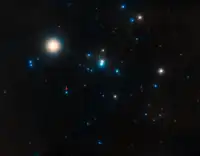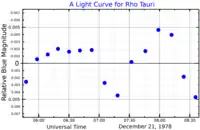 | |
| Observation data Epoch J2000.0 Equinox J2000.0 | |
|---|---|
| Constellation | Taurus |
| Right ascension | 04h 33m 50.91753s[1] |
| Declination | +14° 50′ 39.9232″[1] |
| Apparent magnitude (V) | 4.66[2] |
| Characteristics | |
| Spectral type | A8V[3] |
| U−B color index | +0.09[2] |
| B−V color index | +0.24[2] |
| Variable type | δ Scuti[4] |
| Astrometry | |
| Radial velocity (Rv) | +39.6[5] km/s |
| Proper motion (μ) | RA: 103.20[1] mas/yr Dec.: −26.48[1] mas/yr |
| Parallax (π) | 20.61 ± 0.57 mas[1] |
| Distance | 158 ± 4 ly (49 ± 1 pc) |
| Absolute magnitude (MV) | +1.26[6] |
| Details | |
| Mass | 1.88[6] or 2.09 ± 0.21[7] M☉ |
| Luminosity | 1.39[7] L☉ |
| Surface gravity (log g) | 4.02[7] cgs |
| Temperature | 7,640[7] K |
| Rotational velocity (v sin i) | 117[6] km/s |
| Other designations | |
| Database references | |
| SIMBAD | data |
Rho Tauri (ρ Tau, ρ Tauri) is a star in the constellation Taurus and a member of the Hyades star cluster.[7]
Rho Tauri is a white A-type main sequence dwarf with a mean apparent magnitude of +4.66. It is approximately 158 light years from Earth. Classified as a Delta Scuti type[7] variable star, its brightness varies by 0.010 magnitudes over a period of 1.61 hours.[4]
It has 1.88 times the mass of the Sun, with a projected rotational velocity of 117 km/s and an estimated rotation period of 488.5 days.[6]
 Hyades, with ρ Tau appearing blue, left of center, marked with a red arrow
Hyades, with ρ Tau appearing blue, left of center, marked with a red arrow
References
- 1 2 3 4 5 van Leeuwen, F. (November 2007), "Validation of the new Hipparcos reduction", Astronomy and Astrophysics, 474 (2): 653–664, arXiv:0708.1752, Bibcode:2007A&A...474..653V, doi:10.1051/0004-6361:20078357, S2CID 18759600
- 1 2 3 Mermilliod, J.-C. (1986), "Compilation of Eggen's UBV data, transformed to UBV (unpublished)", Catalogue of Eggen's UBV Data, SIMBAD, Bibcode:1986EgUBV........0M.
- ↑ Cowley, A.; et al. (April 1969), "A study of the bright A stars. I. A catalogue of spectral classifications", Astronomical Journal, 74: 375–406, Bibcode:1969AJ.....74..375C, doi:10.1086/110819.
- 1 2 Solano, E.; Fernley, J. (April 1997), "Spectroscopic survey of delta Scuti stars. I. Rotation velocities and effective temperatures", Astronomy & Astrophysics Supplement Series, 122: 131–147, Bibcode:1997A&AS..122..131S, doi:10.1051/aas:1997329.
- ↑ Evans, D. S. (June 20–24, 1966), "The Revision of the General Catalogue of Radial Velocities", in Batten, Alan Henry; Heard, John Frederick (eds.), Determination of Radial Velocities and their Applications, Proceedings from IAU Symposium no. 30, vol. 30, University of Toronto: International Astronomical Union, p. 57, Bibcode:1967IAUS...30...57E.
- 1 2 3 4 Pizzolato, N.; et al. (September 2000), "Evolution of X-ray activity of 1-3 Msun late-type stars in early post-main-sequence phases", Astronomy and Astrophysics, 361: 614–628, Bibcode:2000A&A...361..614P.
- 1 2 3 4 5 6 Gebran, M.; et al. (November 2010), "Chemical composition of A and F dwarfs members of the Hyades open cluster", Astronomy and Astrophysics, 523: A71, arXiv:1006.5284, Bibcode:2010A&A...523A..71G, doi:10.1051/0004-6361/200913273, S2CID 7164596.
- ↑ "rho Tau -- Variable Star of delta Sct type", SIMBAD, Centre de Données astronomiques de Strasbourg, retrieved 2014-12-28
- ↑ Horan, S. (November 1979). "A photometric survey of the Hyades for delta Scuti variables". Astronomical Journal. 84: 1770–1774. Bibcode:1979AJ.....84.1770H. doi:10.1086/112607. Retrieved 5 September 2022.
This article is issued from Wikipedia. The text is licensed under Creative Commons - Attribution - Sharealike. Additional terms may apply for the media files.